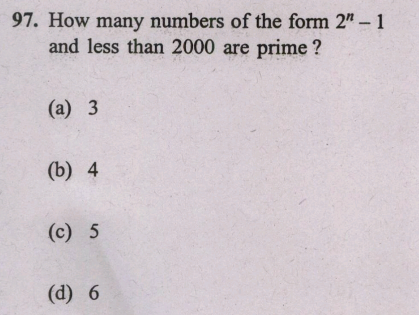
Question Number 211443 by BaliramKumar last updated on 09/Sep/24

Answered by A5T last updated on 09/Sep/24

$${Note}\:{that}\:{n}\leqslant\mathrm{10}\:{and}\:{cannot}\:{be}\:{composite} \\ $$$$\Rightarrow{It}\:{remains}\:{to}\:{check}\:{for}\:{n}=\mathrm{2},\mathrm{3},\mathrm{5},\mathrm{7} \\ $$$$\mathrm{2}^{\mathrm{2}} −\mathrm{1}=\mathrm{3};\mathrm{2}^{\mathrm{3}} −\mathrm{1}=\mathrm{7};\mathrm{2}^{\mathrm{5}} −\mathrm{1}=\mathrm{31};\mathrm{2}^{\mathrm{7}} −\mathrm{1}=\mathrm{127} \\ $$$$\Rightarrow{only}\:\mathrm{4}\:{are}\:{prime} \\ $$
Commented by BaliramKumar last updated on 09/Sep/24

$${thanks} \\ $$
